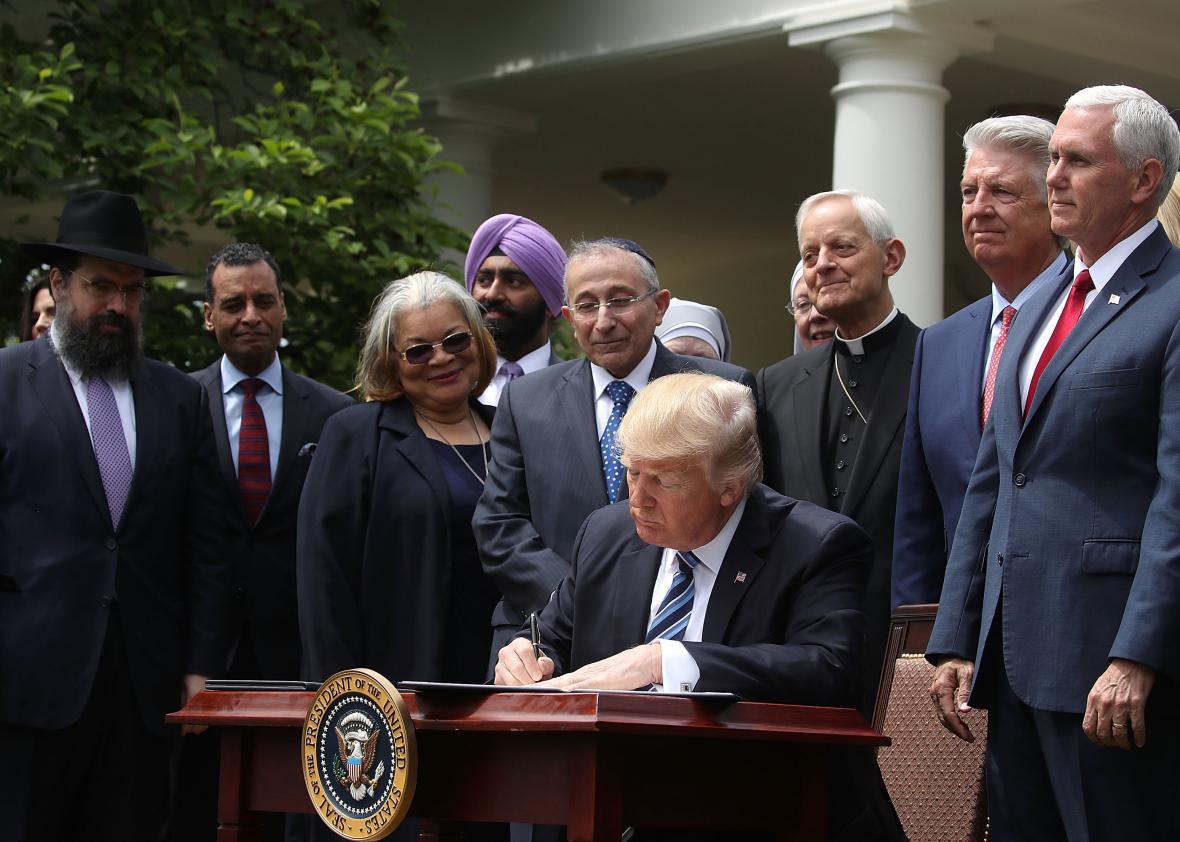Repealing the so-called Johnson Amendment, which effectively prohibits pastors from engaging in partisan politics from the pulpit, has been one of Donald Trump’s most consistent promises to Christian voters. “I am going to work very hard to repeal that language and protect free speech for all Americans,” he vowed in his speech at the Republican National Convention last summer. At his first National Prayer Breakfast as president, he said he would “totally destroy” the amendment. “I will do that—remember,” he added.
Thursday morning, Trump kept that promise. In a Rose Garden ceremony arranged to coincide with the National Day of Prayer, the president signed an executive order that aims to ease the provision’s restrictions. “This financial threat against the faith community is over,” Trump said, televangelist Paula White nodding vigorously behind him. It would require an act of Congress to change the law itself, but Trump’s order instructs the Treasury Department to “not take any adverse action” against religious leaders or organizations who speak “about moral or political issues from a religious perspective.”
In his announcement, Trump tried to tap into the widespread sense among his evangelical base they are losing cultural influence and that their beliefs and institutions are under attack. “You’re now in a position to say what you want to say,” he told the religious leaders who had gathered to watch the signing. “No one should be censoring sermons or targeting pastors.”
The peculiar thing is that no one is censoring sermons or targeting pastors. Pastors can—and do—preach about abortion, immigration, sexuality, war, economic inequality, the environment, and beyond, taking positions all along the political spectrum. Two days before the election, many churches screened a video during Sunday services of Mike Pence promising that he and Trump would repeal the Johnson Amendment. None of them have lost their tax-exempt status for doing so.
The lack of persecution is not for lack of seeking it out. Since 2008, a conservative nonprofit has sponsored an annual “Pulpit Freedom Sunday,” in which pastors deliver politically charged sermons and mail recordings in to the IRS in hopes of provoking a lawsuit. Around 2,000 pastors have participated annually in recent years, but the IRS has audited just one church and punished none. Only one church has ever lost its tax-exempt status because of the Johnson Amendment, and notably, it had nothing to do with sermon content. An upstate New York church took out full-page ads in several major newspapers in 1992 urging Christians not to vote for Bill Clinton. That meant tax-exempt money was being used to purchase political advertising. (Indeed, the primary practical effect of today’s order is that churches can now serve as a funnel for tax-deductible campaign donations, as my colleague Dahlia Lithwick explains.)
That may be why almost no one other than Trump seems to care much about the Johnson Amendment. The very narrow issue of whether pastors can endorse politicians is simply not what “religious freedom” means to most religious people. A February survey of evangelical leaders found 89 percent believe pastors shouldn’t endorse candidates; a larger survey of evangelical pastors in 2012 found virtually the same results. Ross Douthat tweeted on Thursday morning that the topic “has literally never come up” in his years of conversations about religious liberty with leaders of religious institutions. A survey released last fall found that only 20 percent of Protestants and 13 percent of Catholics see political endorsements from the pulpit as appropriate.
Even conservatives who do care about the Johnson Amendment don’t sound terribly satisfied today. For one, the order can easily be overturned by the next administration, leaving pastors and their congregations vulnerable if they exercise their new rhetorical freedoms over the next four or eight years. In the National Review, David French called it “constitutionally dubious, dangerously misleading, and ultimately harmful to the very cause that it purports to protect.” The Alliance Defending Freedom, which sponsors Pulpit Freedom Sunday, said the executive order leaves Trump’s promises on religious freedom unfulfilled. Other religious conservatives are disappointed that the order has been stripped of many of the more controversial provisions included in a draft of the order that leaked in February. “This is not the executive order many evangelicals had been praying for,” Christianity Today wrote.
Although today’s order is missing many of the meatier changes social conservatives were hoping for, it does gesture toward easing restrictions on religious objections to the Affordable Care Act’s so-called contraceptive mandate, which requires employer insurance plans to cover birth control. Some religious employers object to forms of contraception they believe are abortifacients, and the legal drama over how to resolve that objection had become almost hilariously baroque, involving dispute over what kind of forms the objectors would be willing to fill out to signify their objections. The new order says the Treasury Secretary, Labor Secretary and Secretary of Health and Human Services “shall consider issuing amended regulations” to address those objections, but does not go into further detail. In a less-than-enthusiastic response, the National Association of Evangelicals urged the administration to clarify by issuing revised regulations on the matter.
As for the Johnson amendment, if Trump is hoping that today’s order will lead to a flood of endorsements for his re-election campaign, he may be in for a rude surprise. A Pew survey last year found that churchgoers who did hear political endorsements from the pulpit tended to belong to black Protestant churches—and those pastors were endorsing Hillary Clinton.
